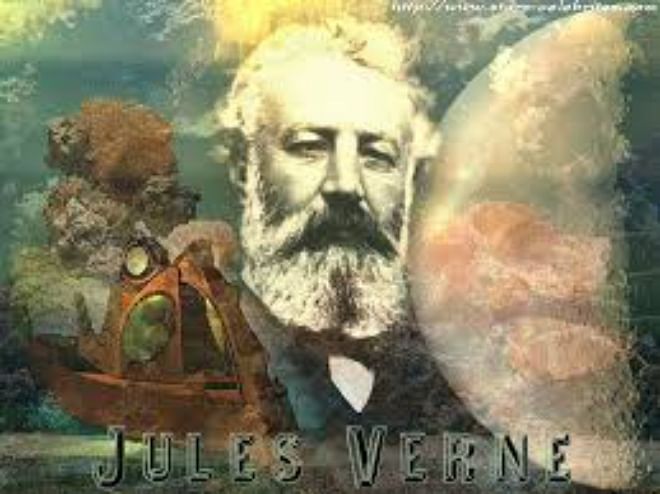Jules Verne and the imagination

Today is the 186th birth anniversary of a writer who is the second most-translated author in the world since 1979 --- somewhere between the English-language writers Agatha Christie and William Shakespeare. Often labelled as “the father of science fiction”, Verne's competence is not restricted to being a pure science fiction writer, since he himself argued repeatedly in interviews that his novels were not meant to be read as scientific. As he put it, "I do not in any way pose as a scientist" and "I have invented nothing." His own goal was rather to "depict the earth [and] at the same time to realize a very high ideal of beauty of style". But his profound influence on the development of science fiction is indisputable.
Many among his novels, notably Twenty Thousand Leagues under the Sea, From the Earth to the Moon, The Adventures of Captain Hatteras, Five Weeks in a Balloon, Journey to the Centre of the Earth, along with a few others involve elements of advanced imagination and technology that were fantastic for his day and later became commonplace. Jules Verne indeed left behind a writing legacy built upon scientific influence, that is yet being acclaimed by submarine designers to aviation pioneers, rocketry innovators to polar explorers to army generals to….and the list goes on
For this writer Jules Verne was a rare talent, who was capable of weaving a story with mystery, imagination, adventure and science fiction all together. Beyond this, Verne to a greater extent could influence and shape the thoughts of his young readership; and I am no exception to that. It was on a sultry June day when I got hold of the Bengali translation of Around the World in Eighty Days (Ashi Dine Bishwa Bhromon) during the mid 1980s.I finished it at one go and when the movie of the week programme showed the full length movie about a month later, with David Niven playing Phileas Fogg, my plan for the next day was set. Since the world was not possible for a ten year-old, the youth's obsessed mind planned to trot the whole of Dhaka in less than twelve hours. Of course that day never came. Experiments with a balloon seller, who then sat at the open courtyard of the Balaka cinema hall, never turned into a reality (as the Verne-obsessed schoolboy was almost always short of cash). The unused toy submarine made of corrugated iron sheets inspired by the adventures of Captain Nemo only got rustier by the day.
Nevertheless, with coming of age at least one notable place referred to in the Jules Verne novels needed to be visited. As the saying goes, where there is a will there is a way. In 1995 this writer went to London, just after his SSC exams and finally managed to step inside the much renowned Reform Club. It was from here that Fogg, on 2 October 1872, accepted a wager for £20,000 from his fellow club members on the condition that he travel across the globe in 80 days while being present to receive the wager at the club on the 80th day.
Thus, Jules Verne was paid his unpaid tribute. That nostalgia of thrill remains till today. While planning for a vacation somewhere remote, it's some of the Jules Verne stories that keep coming back.
A fact to help would-be writers of tomorrow is: that Jules Verne could become what he is today is largely due to his persevering power as far as writing goes. An even more revealing fact is that in relation to 19th century literature, Jules Verne owed the inspiration for his first success to another author—who had nearly been forgotten by his own countrymen. Five Weeks in a Balloon (Cinq semains en ballon, 1863), Verne's first novel was influenced by Baudelaire's translation of an American author who died unremarked in his own country: Edgar Allen Poe.
One wonders what novels Jules Verne might have written had he been alive today. Perhaps science fiction or adventure, one doesn't know. But one can confirm he would attempt to give his readers' imaginations a dash of reality. As he himself noted, “Reality provides us with facts so romantic that imagination itself could add nothing to them.” That's why we needed a Jules Verne. We had one.
We are happy that he existed for the cause of writing. And I am happy as I still live the stories he once wrote.
Shahriar Feroze is current affairs analyst, The Daily Star

 For all latest news, follow The Daily Star's Google News channel.
For all latest news, follow The Daily Star's Google News channel. 



Comments